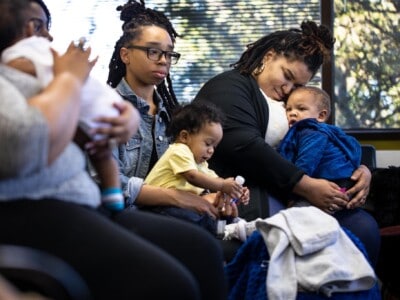Jaymie Rivera-Clemente expected the arrival of her first child to be a pure and joyous experience.
Like every mother, she wanted a normal and healthy delivery. She longed for the first touch, the first kiss and the first opportunity to hold her baby on her chest. But unfortunately, Rivera-Clemente’s introduction to motherhood was stained with traumatic memories.
“I crowned my baby in the toilet,” she said. “My nurse wasn’t talking to me or telling me the things that were going on with my body.”
As Rivera-Clemente sat alone in the restroom, her baby’s head began to emerge. Because her nurse had failed to inform her of the changes her body could experience before delivery, she was unable to recognize that she didn’t actually need to use the bathroom. The pressure she felt was her baby’s head moving past her dilated cervix into her birth canal.
Rivera-Clemente prayed this would be her only and last traumatic birth experience, but she later faced two additional traumatic births. During her second delivery, her son “experienced shoulder dystocia, where his shoulder could not pass without significant manipulation,” leaving him with multiple learning disabilities. She is one of many black mothers who has experienced trauma during childbirth.
Every day countless black mothers risk their lives giving birth as a result of racist policies and practices derived from the era of slavery, according to an article published in the Journal of Women’s Health. Black women in Texas are 2.3 times more likely to die while giving birth compared to white women, regardless of income, education, marital status or health factors, according to a Joint Biennial Report published by the Maternal Mortality and Morbidity Task Force and Department of State Health Services.
Research shows maternal deaths among black women are not confined to childbirth. Black mothers are extremely vulnerable during the postpartum period as well. The Task Force reports a “majority of the maternal deaths of Black women during 2012-2015 occurred between 43 to 365 days postpartum.” With Medicaid coverage ending six weeks (42 days) after a woman gives birth, this finding was particularly concerning because 69 percent of maternal deaths were black women who had Medicaid health insurance during this time.
Researchers have identified institutional racism as the biggest determinant of negative outcomes for black mothers. Michele Rountree, associate professor in the Steve Hicks School of Social Work, who identifies as black, is facing this issue head on. With generous funding from the St. David’s Foundation Focus on the Fourth Initiative, she founded Black Mamas Community Collective to save the lives of black mothers in Travis County through education, awareness and proposed policy solutions.
Comprised of black mothers, activists and leaders, Black Mamas provides services and support to black women through programs, advocacy, training, outreach and research. Black Mamas hosts sister-circle support meetings, where sister doulas (women who are trained to support mothers and families during and after childbirth) and a sister behavioral health provider share advice with mothers. Because sister doulas play a crucial role in supporting black mothers during the postpartum period, the meetings serve as a safe space for expectant and postpartum black mothers to come together. In an effort to disrupt the maternal mortality disparity, Black Mamas also advocates for diversity within the Texas healthcare system.
“The percentage of black doctors, social workers, and other healthcare providers does not reflect the populations they’re serving,” Rountree said. “There’s definitely a need for us to cultivate this pipeline to reflect the racially and ethnically diverse communities who make the state of Texas their home.”
In addition to advocating for ethnic diversity in the health care workforce, Black Mamas provides training to healthcare professionals to recognize and address institutional racism. The training, facilitated by Joyce James Consulting, brings light to racial disparities within multiple systems serving communities of color. Rountree said the training gives health-care professionals an opportunity to view practices and policies within their institutions through a race-equity lens.
“What’s been so powerful about this movement is the opportunity to highlight that there is nothing wrong with black women,” she said. “We approach this work with the genuine belief that health-care professionals gravitate to this field to help and not harm. It’s important that institutions serving black women are responsive, that they turn a mirror on their own structures to see which ones may be contributing to these disparities instead of blaming black women for their outcomes.”
__
The collective is currently seeking expecting mothers to participate in Sister Circle meetings and fathers who have lost the mother of their child due to complications resulting from child birth. For more information about Black Mamas Community Collective and to get involved, visit blackmamasatx.com.
By Montinique Monroe. Posted February 25, 2019.


